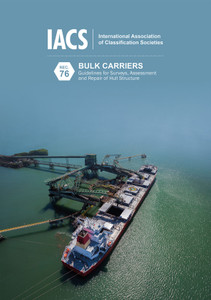
This publication is a guide to the potential problems experienced when loading and discharging heavy and high-density cargoes and the resulting safety responsibilities of ships’ officers.
This guide focuses on the potential physical damage that can incur on board bulk carriers due to the improper handling, loading and discharging of heavy and high-density cargoes.
It covers topics such as:
- Hull structural failure
- loads, hull structure and design
- cargo distribution
- planning, loading and control of cargo handling
- ballast water management
- safety considerations.
In 2019, about 11,700 bulk carriers represent 35% of the world fleet gross tonnage. Heavy and high-density cargoes – mineral ores for example – make high physical demands on ships’ structures, especially in the cargo hold area.
Bulk carriers must be handled with care in port as well as at sea. Stevedores and ships’ officers responsible for cargo operations become key partners for ship safety, because the lives of seafarers may ultimately depend on careful cargo handling. Ship-to-shore planning, information and communication become vital.
Port and terminal authorities, together with owners and classification societies, therefore have a role to minimise risk in bulk carrier operations. IACS – whose members class over 90% of the world bulk carrier fleet – has investigated why bulk carriers have become vulnerable to structural problems, how their safety margins can be increased and how day-to-day operations can become safer for their seafarers.
IACS’ research shows that improper handling of heavy, high density cargo during cargo loading and discharge may cause excessive stress on ship structures and physical damage to holds and transverse bulkheads. Over time, this may reduce or threaten structural safety margins when the ship is at sea in heavy weather. Careful cargo handling helps maintain bulk carrier safety – bad practice lowers safety margins and increases the risk of damage.
This IACS booklet is part of a continuing series of publications dedicated to safer bulk carrier operations. Summarising the main problems in loading and discharging heavy and high-density cargo, it then considers technical factors from the viewpoints of design limitations and the ship safety responsibilities of the ships’ officers.
The main cargo handling risks are:
- Poor ship-to-shore communications
- Ignoring Loading Plans
- Inadequate pre-planning of cargo operations
- Improper load distribution between holds
- Overloading by high-capacity systems
- Physical damage during discharging.
Introduction
Chapter 1: Hull Structural Failure
Chapter 2: Potential Problems
Chapter 3: Loads, Hull Structure and Design
Chapter 4: Cargo Distribution
Chapter 5: Loading Guidance Information
Chapter 6: Planning and Control of Cargo Handling
Chapter 7: Ballast Water Management at Sea
Chapter: 8 IACS and Bulk Carrier Safety
IACS
Dedicated to safe ships and clean seas, IACS makes a unique contribution to maritime safety and regulation through technical support, compliance verification and research development. More than 90% of the world’s cargo carrying tonnage is covered by the classification design, construction and through-life compliance rules and standards set but the twelve Members Societies of IACS.
IACS is a not for profit membership organisation of classification societies that establish minimum technical standards and requirements that address maritime safety and environmental protection and ensures their consistent application. It carries out this responsibility through its panels, expert groups and project teams and provides a Quality System Certification Scheme (QSCS) that its Members comply with, as an assurance of professional integrity and maintenance of high professional standards. IACS is recognized as the principle technical advisor of IMO.
- Number of Pages:
- 39
- ISBN:
- 9781856099226
- Binding Format:
- Paperback
- Book Height:
- 234 mm
- Book Width:
- 156 mm
- Weight:
- 0.5 kg
- Author:
IACS
- Published Date:
- July 2020
- Preview:
- Yes




